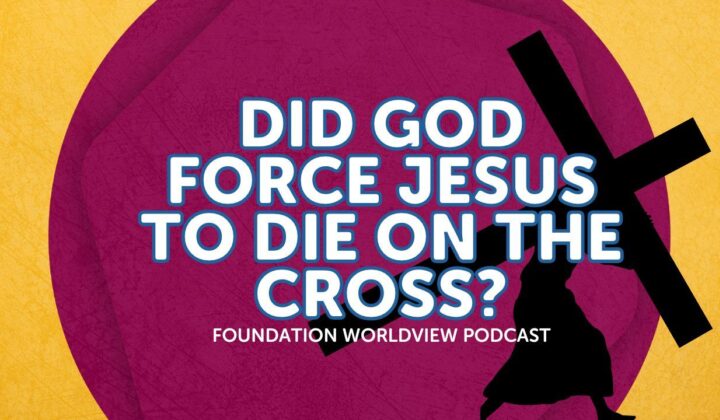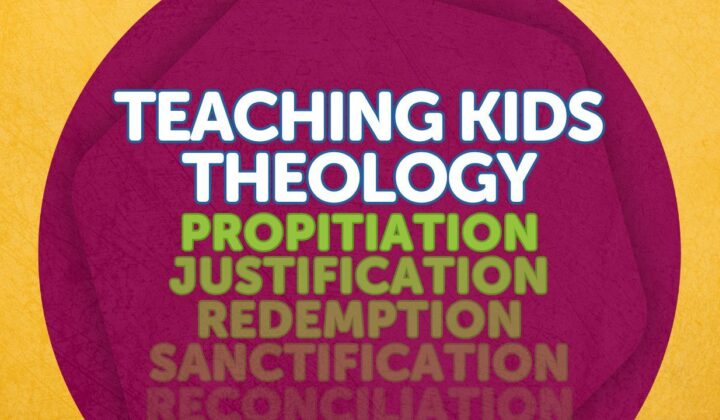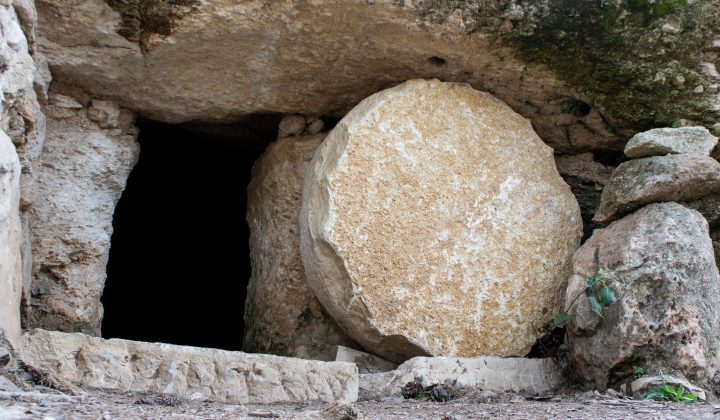Learn more about the journey that led to us equipping kids to carefully evaluate every idea they encounter.
Meet members of our team who have contributed to curriculum development.
Hear from real users of the Foundation Curriculum.
Learn what we believe about God, Jesus, Scripture, and more.
Is It Unjust for Jesus to Be Punished for Our Sin?
Hello, friends! Today's podcast question is a deep one:
"We know that God is just. Isn't it contradictory to His character that He would call an innocent man—Jesus—to be punished for the guilty?"
This is a little different from our usual questions. We often discuss how to explain theological concepts to children, but this question is more about understanding God’s justice at a fundamental level. Still, it's important that we know how to think through this question so we can help our kids process similar challenges.
So today, we’re going to dive deep into this topic here on the Foundation Worldview Podcast, where we seek to answer your questions so that you can equip the children God has placed in your care to carefully evaluate every idea they encounter and understand the truth of the biblical worldview.
I'm your host, Elizabeth Urbanowicz, and I’m so glad you’ve joined me today!
Three Steps to Answering This Question
When we’re faced with tough theological questions—whether from our own hearts or from others—we need to teach our children how to think critically and biblically. A helpful approach is to walk through three key questions:
- Is any part of this claim true?
- Is any part of this claim false?
- How can I wisely respond?
Let’s apply these questions to today's topic.
Step 1: Is Any Part of This Claim True?
Yes, multiple parts of this claim are true:
First, the statement that God is just is accurate. The Bible clearly teaches that justice is part of God’s character. Deuteronomy 32:4 states, "His work is perfect, for all His ways are justice. A God of faithfulness and without iniquity, just and upright is He."
Second, the claim that Jesus is innocent is also true. First Peter 2:22-23 says, "He committed no sin, neither was deceit found in his mouth. When he was reviled, he did not revile in return; when he suffered, he did not threaten but continued entrusting himself to him who judges justly."
Third, Jesus was punished for the guilty. Second Corinthians 5:21 says, "For our sake, he made him to be sin who knew no sin, so that in him we might become the righteousness of God."
These three elements of the claim are true—God is just, Jesus was innocent, and Jesus bore the punishment for sin.
Step 2: Is Any Part of This Claim False?
One potential issue with this claim is the phrase "innocent man." If someone asked this question in person, I would ask them to clarify what they mean by that phrase. Are they implying that Jesus was just another human? Do they believe that God arbitrarily selected an innocent person for punishment?
If the question assumes that Jesus was merely a man, that is incorrect. Jesus is not just an innocent man—he is God the Son.
John 1:14 states, "And the Word became flesh and dwelt among us, and we have seen His glory, glory as of the only Son from the Father, full of grace and truth."
Jesus was not a random human chosen to bear punishment. He is God incarnate, who willingly took on human flesh and bore God’s wrath for sin. That makes all the difference.
Step 3: How Can I Wisely Respond?
Now that we’ve identified what is true and what might be misunderstood, we need to think about how to respond.
The key question we are left with is:
Is it unjust for God the Father to send Jesus, God the Son, to bear the punishment for our sins?
To answer this, we first need to define justice. Justice is doing what is morally right.
When a crime is committed, justice demands that something be done to make it right. In our legal system, when someone is found guilty, there is a penalty.
Our sin is a crime against God. He is not just our Creator—He is also our Judge, the standard of all goodness. The just punishment for sin is eternal separation from God. But Jesus bore that punishment for us.
John 10:17-18 records Jesus’ own words: "For this reason, the Father loves me, because I lay down my life that I may take it up again. No one takes it from me, but I lay it down of my own accord."
Jesus was not forced to die. He chose to lay down His life. God did not impose punishment on an unwilling victim—Jesus willingly took our place.
An Everyday Example (Imperfect, but Helpful)
Imagine someone hacked into the Foundation Worldview website and completely destroyed it. The just action would be for the hacker to restore what they had broken.
Now, let’s say I chose to pay the cost myself—my time, my resources, my finances—to make it right. Would that be unjust? No, because I willingly took on the cost.
Similarly, Jesus willingly bore the penalty for our sin. God's justice was not violated—Jesus satisfied it in our place.
God’s Justice and Mercy Meet at the Cross
Theologians often say, "The cross is where God’s justice and mercy meet."
Justice means sin was punished.
Mercy means Jesus bore that punishment for us.
Praise God that He is both just and merciful!
Final Thoughts
This three-question method can help children (and adults) navigate theological questions:
- Is any part of this claim true?
- Is any part of this claim false?
- How can I wisely respond?
If you want to equip your kids with tools to evaluate ideas critically, I highly recommend checking out our Careful Thinking Curriculum for ages 10 and up. It systematically trains kids to analyze the many ideas they’ll encounter in the world.
Closing Encouragement
That’s a wrap for today’s episode! If you found this content helpful, please like and subscribe so you don’t miss future episodes.
If you have a question you’d like answered, submit it at foundationworldview.com/podcast—we couldn’t do this without your questions!
As always, my prayer for you is that no matter the situation you and the children God has placed in your care find yourselves in, you would trust that God is working all things together for your good by using all things to conform you more into the image of His Son.
See you next time!
Related Posts and insights

Did God Force Jesus to Die on the Cross?
In this episode of the Foundation Worldview Podcast, host Elizabeth Urbanowicz tackles the question of whether God forced Jesus to die on the cross. She shares how to approach this question with children and emphasizes the importance of affirming their curiosity and directing them to Scripture for answers. This episode provides practical guidance for parents and caregivers on how to navigate theological questions with children.

Teaching Kids Theology
How do you explain big theological words like justification, sanctification, propitiation, redemption, and reconciliation to children in a way they can understand? In this episode of the Foundation Worldview Podcast, Elizabeth Urbanowicz walks through a simple three-step approach to teaching these complex concepts to kids of all ages. You'll learn how to create easy definitions, pair them with body movements, and provide key Bible verses to help children grasp these truths.

How To Teach Kids That The Resurrection Is Historically Reliable
More than doing creative activities about the resurrection story, kids wonder the same thing as adults - is the resurrection historically reliable?



